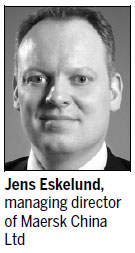Maersk buoys Chinese partners
Maersk Line, the world's biggest container shipping company by capacity and goods volume, will provide transport services for its Chinese partners and become a co-investor in their projects along the Belt and Road Initiative over the next decade.
Many projects have already materialized. APM Terminals, the Danish group's terminal arm, partnered with China COSCO Shipping Ports Ltd and Qingdao Port International Development Co in October to invest in the Vado Reefer Terminal, and the new deep-water container terminal under construction in Vado, Italy. It will become operational in 2018.
APM Terminals is also working with State-owned China Communications Construction Co, one of the largest infrastructure service providers by revenue, to build a new port in Tema, Ghana. Maersk has appointed a CCCC subsidiary as lead contractor to carry out civil engineering works for this project.
"We're seeking to develop closer links with Chinese companies involved in these two trading routes, helping them to expand globally through our network, transport and logistics services," said Jens Eskelund, managing director of Maersk China Ltd.

China is Maersk Line's largest export market, accounting for more than 35 percent of the Danish company's global export volumes.
Through its intra-Asia arm MCC Transport, Maersk Line operates a comprehensive network of services between China and member countries of the Association of Southeast Asian Nations.
In addition to services from the main ports, several smaller ports in the region, including Sibu in Malaysia or Davao in the Philippines, have been added to the network.
MCC also launched a direct service connecting Qinzhou of Guangxi Zhuang autonomous region to Tanjung Pelepas and Singapore last year, which makes MCC the first foreign liner that offers direct weekly service to Qinzhou.
Eskelund said in a challenging market characterized by overcapacity and low freight rates, the company's current focus is on improving profitability.
Maersk Line continues to face challenging market conditions. It posted a loss of $116 million in the third quarter of the year, compared to a profit of $264 million in the same period of 2015.
"Maersk will continue to improve efficiency, lower bunker consumption and a razor-sharp focus on costs. In addition, we manage our capacity tightly with a disciplined order book and other initiatives including idling and blank sailing," he said.
zhongnan@chinadaily.com.cn
(China Daily 11/21/2016 page14)






















